Ditapis dengan
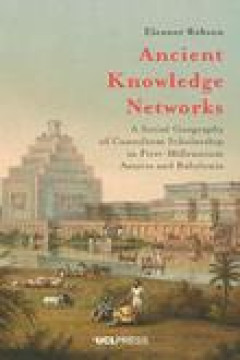
Ancient knowledge networks :a social geography of cuneiform scholarship in fi…
Ancient Knowledge Networks is a book about how knowledge travels, in minds and bodies as well as in writings. It explores the forms knowledge takes and the meanings it accrues, and how these meanings are shaped by the peoples who use it. Addressing the relationships between political power, family ties, religious commitments and literate scholarship in the ancient Middle East of the first m…
- Edisi
- -
- ISBN/ISSN
- 9781787355941
- Deskripsi Fisik
- XXIII, 314 p.
- Judul Seri
- -
- No. Panggil
- 935 ROB a

Horizontal learning in the high middle ages:peer-to-peer knowledge transfer i…
The history of medieval learning has been studied both as a vertical master-student phenomenon, and as part of a broad 'educational environment'. This volume centers on the ways in which cohabiting peers learned and taught one another in a dialectical process - how they acquired knowledge and skills, but also how they developed concepts, beliefs, and adapted their behavior to suit the group: ev…
- Edisi
- -
- ISBN/ISSN
- 9789048532919
- Deskripsi Fisik
- 301p. : ill
- Judul Seri
- -
- No. Panggil
- 370.902 HOR h
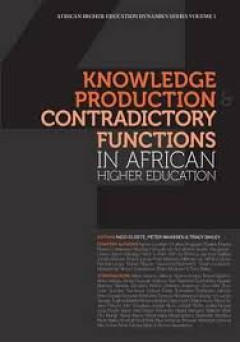
Knowledge production and contradictory functions in African higher education
This volume brings together excellent scholarship and innovative policy discussion to demonstrate the essential role of higher education in the development of Africa and of the world at large. Based on deep knowledge of the university system in several African countries, this book will reshape the debate on development in the global information economy for years to come. It should be mandatory …
- Edisi
- -
- ISBN/ISSN
- 9781920677855
- Deskripsi Fisik
- -
- Judul Seri
- -
- No. Panggil
- 370 CLO k

Epistemology and transformation of knowledge in global age
This book consists of seven chapters containing multiple questions of the global socially epistemological situation in science and higher education. Despite the progress of techno-sciences, we are facing blind flaws in leading systems of knowledge and perception. The global era, in a paradox way, connects the new knowledge of economics, postpolitics, postdemocracy, and biopolitical regulation o…
- Edisi
- -
- ISBN/ISSN
- 9789535133872
- Deskripsi Fisik
- 148 p.; 22 cm.
- Judul Seri
- -
- No. Panggil
- 100 EPI e

The delusion of knowledge transfer :the impact of foreign aid experts on poli…
With the rise of the ‘knowledge for development’ paradigm, expert advice has become a prime instrument of foreign aid. At the same time, it has been object of repeated criticism: the chronic failure of ‘technical assistance’ – a notion under which advice is commonly subsumed – has been documented in a host of studies. Nonetheless, international organisations continue to send advisor…
- Edisi
- -
- ISBN/ISSN
- 9781928331391
- Deskripsi Fisik
- XI, 383 p
- Judul Seri
- -
- No. Panggil
- 330.968 KOC d
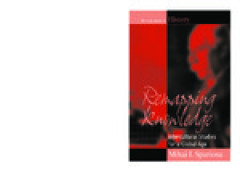
Remapping knowledge :intercultural studies for a global age
The growing interdependence of the local and the global demand innovative approaches to human development. Such approaches, the author argues, ought to be based on the emerging ethics of global intelligence, defined as the ability to understand, respond to, and work toward what will benefit all human beings and will support and enrich all life on this planet. As no national or supranational aut…
- Edisi
- -
- ISBN/ISSN
- 9781785336614
- Deskripsi Fisik
- XVII, 209 p.
- Judul Seri
- -
- No. Panggil
- 306 SPA r
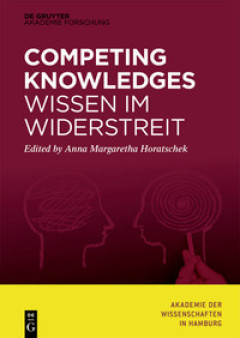
Competing knowledges – wissen im widerstreit
Whatever societies accept as ‘knowledge’ is embedded in epistemological, institutional, political, and economic power relations. How is knowledge produced under such circumstances? What is the difference between general knowledge and the sciences? Can there be science without universal truth claims? Questions like these are discussed in eleven essays from the perspective of Sociology, Law, …
- Edisi
- -
- ISBN/ISSN
- 9783110659658
- Deskripsi Fisik
- X, 220 p.
- Judul Seri
- -
- No. Panggil
- 121 COM c

Knowledge and the norm of assertion:an essay in philosophical science
- Edisi
- -
- ISBN/ISSN
- 9781783741861
- Deskripsi Fisik
- x + 116 p.; 23 cm.
- Judul Seri
- -
- No. Panggil
- 306.44 JOH k
- Edisi
- -
- ISBN/ISSN
- 9781783741861
- Deskripsi Fisik
- x + 116 p.; 23 cm.
- Judul Seri
- -
- No. Panggil
- 306.44 JOH k
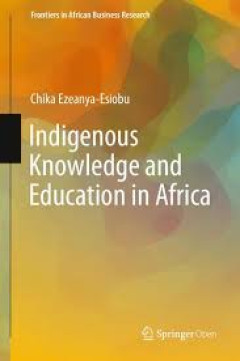
Indigenous knowledge and education in Africa
This open access book presents a strong philosophical, theoretical and practical argument for the mainstreaming of indigenous knowledge in curricula development, and in teaching and learning across the African continent. Since the dawn of political independence in Africa, there has been an ongoing search for the kind of education that will create a class of principled and innovative citizens wh…
- Edisi
- -
- ISBN/ISSN
- 9789811366352
- Deskripsi Fisik
- -
- Judul Seri
- -
- No. Panggil
- 370.96 EZE i

The evolutionary dynamics of discursive knowledge :communication-theoretical …
This open access book have three themes have been central to Leydesdorff's research: (1) the dynamics of science, technology, and innovation; (2) the scientometric operationalization of these concept; and (3) the elaboration in terms of a Triple Helix of university-industry-government relations. In this study, I discuss the relations among these themes. Using Luhmann's social-systems theory for…
- Edisi
- -
- ISBN/ISSN
- 9783030599515
- Deskripsi Fisik
- x, 247p. : ill.
- Judul Seri
- -
- No. Panggil
- 301.072 LEY e

Information and knowledge organisation in digital humanities:global perspectives
Information and Knowledge Organisation explores the role of knowledge organisation in the digital humanities. By focusing on how information is described, represented and organised in both research and practice, this work furthers the transdisciplinary nature of digital humanities. Including contributions from Asia, Australia, Europe, North America and the Middle East, the volume explores the p…
- Edisi
- -
- ISBN/ISSN
- 9781003131816
- Deskripsi Fisik
- xxiii, 290 p. : ill.
- Judul Seri
- -
- No. Panggil
- 658.038 GOL i

Narrative Science :Reasoning, Representing and Knowing since 1800
Narrative Science examines the use of narrative in scientific research over the last two centuries. It brings together an international group of scholars who have engaged in intense collaboration to find and develop crucial cases of narrative in science. Motivated and coordinated by the Narrative Science project, funded by the European Research Council, this volume offers integrated and insight…
- Edisi
- -
- ISBN/ISSN
- 9781009004329
- Deskripsi Fisik
- xvi, 500 p ; ill
- Judul Seri
- -
- No. Panggil
- 501.4 NAR
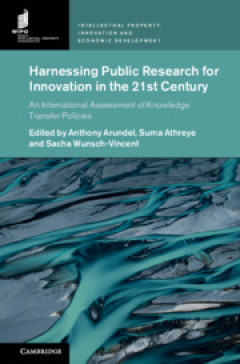
Harnessing Public Research for Innovation in the 21st Century :An Internation…
Universities and public research institutes play a key role in enabling the application of scientific breakthroughs and innovations in the marketplace. Many countries – developed and developing alike – have implemented national strategies to support the application or commercialization of knowledge produced by public research organizations. Universities and public research institutes have i…
- Edisi
- -
- ISBN/ISSN
- 9781108904230
- Deskripsi Fisik
- xxxv, 544 p ; ill
- Judul Seri
- -
- No. Panggil
- 338.926 HER A

Harnessing Public Research for Innovation in the 21st Century :An Internation…
Universities and public research institutes play a key role in enabling the application of scientific breakthroughs and innovations in the marketplace. Many countries – developed and developing alike – have implemented national strategies to support the application or commercialization of knowledge produced by public research organizations. Universities and public research institutes have i…
- Edisi
- -
- ISBN/ISSN
- 9781108904230
- Deskripsi Fisik
- xxxv, 544 p ; ill
- Judul Seri
- -
- No. Panggil
- 338.926 HER A
 Karya Umum
Karya Umum  Filsafat
Filsafat  Agama
Agama  Ilmu-ilmu Sosial
Ilmu-ilmu Sosial  Bahasa
Bahasa  Ilmu-ilmu Murni
Ilmu-ilmu Murni  Ilmu-ilmu Terapan
Ilmu-ilmu Terapan  Kesenian, Hiburan, dan Olahraga
Kesenian, Hiburan, dan Olahraga  Kesusastraan
Kesusastraan  Geografi dan Sejarah
Geografi dan Sejarah